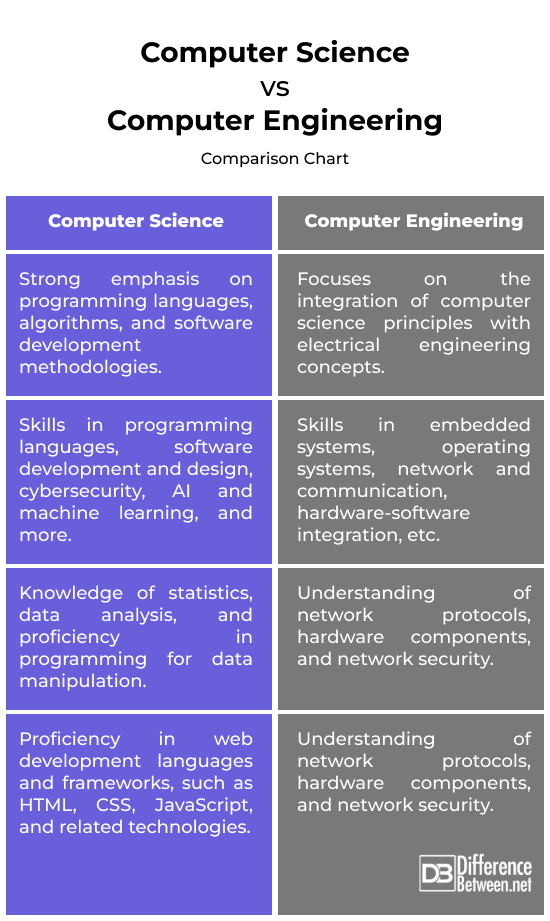Difference Between Job Opportunities for Computer Science and Computer Engineering
Although we often use the terms interchangeably, they indeed represent distinct educational and career paths. When pursuing a career in the computer domain, it’s important to identify the career path that best aligns with your strengths and key skills. That being said, the two most common fields of study that offer dynamic career options are Computer Science and Computer Engineering. In this article, we’ll talk about the two domains and discuss the differences between their job opportunities.

What is Computer Science?
Computer Science is the study of technology that encompasses the study of computers and computational systems. It involves both theoretical and practical aspects, covering a wide range of topics that are crucial in the development and application of computing technologies.
Career opportunities in Computer Science include, but are not limited to:
- Software Developer/Engineer: Designing, coding, testing, and maintaining software applications for various platforms.
- Data Scientist/Analyst: Analyzing and interpreting complex data sets to inform business decisions and strategies.
- Web Developer: Creating and maintaining websites and web applications for businesses and individuals.
- Artificial Intelligence/Machine Learning Engineer: Developing AI and ML algorithms for applications such as natural language processing, image recognition, and predictive analytics.
- Network Engineer: Designing, implementing, and managing computer networks for organizations.
- Database Administrator: Managing and securing databases, ensuring efficient data storage and retrieval.
- Cybersecurity Analyst/Consultant: Protecting computer systems and networks from security breaches and cyber threats.
- Systems Analyst: Analyzing and designing information systems to meet the needs of organizations.
- Game Developer: Creating interactive and engaging video games for entertainment or educational purposes.
- UI/UX Designer: Designing user interfaces and experiences for software applications and websites.

What is Computer Engineering?
Computer Engineering is a specialized field that focuses on the integration of computer science principles with electrical engineering concepts. It involves the design, development, and maintenance of computer systems and networks, with an emphasis on both hardware and software aspects.
Here’s an overview of some career opportunities within Computer Engineering:
- Digital Systems: Studying the design and implementation of digital circuits and systems.
- Computer Architecture: Understanding the organization and structure of computer systems, including processors and memory.
- Embedded Systems: Designing and programming systems with dedicated functions, often found in devices like microcontrollers, IoT devices, and automotive systems.
- Networks and Communication: Learning about the design and maintenance of computer networks, including protocols and data communication.
- VLSI (Very Large Scale Integration) Design: Designing integrated circuits with a large number of transistors for complex functions.
- Firmware Development: Creating low-level software that operates on embedded systems and hardware devices.
- Digital Signal Processing (DSP): Analyzing and manipulating signals to improve the performance of systems like audio processing or image processing.
- Robotics: Designing and programming robots for various applications, including manufacturing and healthcare.
- Computer Hardware Design: Creating and optimizing computer hardware components, such as processors, memory, and peripherals.
- Real-Time Systems: Developing systems that respond to inputs within a specific time frame, often critical in applications like avionics and medical devices.
Difference between Job Opportunities for Computer Science and Computer Engineering
Focus of Study
Computer Science primarily focuses on software development, algorithms, data structures, machine learning, software development methodologies, and problem-solving in the digital domain. Examples may include developing a new sorting algorithm or designing a complex software application.
Computer Engineering is more practical in nature; it integrates hardware and software, covering computer architecture, digital systems, and the design of computer components. Examples may include designing a new processor chip or optimizing the performance of a computer system.
Nature of Work
Computer Science involves writing code, creating algorithms, and developing software applications. The output of their work often includes the development of software applications, the solution to computational problems, and the creation of algorithms.
Computer Engineering involves hardware design, system integration, and firmware development. The work encompasses the creation of computer hardware components, embedded systems, and network infrastructure.
Application Area
The applications of Computer Science are wide-ranging, extending from software development to data analysis and artificial intelligence. It has a profound impact on various industries, including finance, healthcare, entertainment, and technology.
In contrast, Computer Engineering focuses on the physical aspects of computing, such as hardware design and network infrastructure. Its impact is evident in areas like electronics manufacturing, telecommunications, and the development of embedded systems.
Educational Emphasis
Computer Science strongly emphasizes programming languages, algorithms, and software development methodologies. It aims to develop proficiency in coding, problem-solving, and algorithmic thinking through coursework such as Data Structures, Algorithms, and Software Engineering.
In contrast, Computer Engineering encompasses a broader range in its curriculum, covering digital systems, computer architecture, and electronics. It develops skills in hardware design, system integration, and understanding the intricate interaction between hardware and software.
Computer Science vs. Computer Engineering: Comparison Chart

Summary
While there is overlap in certain areas, the distinctions in emphasis between Computer Science and Computer Engineering lead to different career opportunities. Computer Science jobs often revolve around software development and data, while Computer Engineering jobs often involve hardware design, embedded systems, and network infrastructure. The choice between the two depends on individual interests and career goals within the broad field of computing.
FAQs
Which is a better career: computer science or computer engineering?
It depends on individual interests, strengths, and career goals. Computer Science is more software-oriented, involving programming, algorithms, and software development. Computer Engineering, on the other hand, integrates hardware and software and is more focused on designing and building computer systems.
Who gets paid more computer science or computer engineering?
Salary in both fields can vary based on factors like location, experience, industry, and individual qualifications. In general, both Computer Science and Computer Engineering professionals can have lucrative careers.
Which is better: CS or CSE?
CS” typically stands for Computer Science, while “CSE” generally stands for Computer Science and Engineering. The choice between the two may come down to the specific curriculum and focus areas offered by a particular educational institution. It’s advisable to review the curriculum and program details to make an informed decision based on individual preferences.
Which branch of computer science has highest salary?
Some of the high-paying computer science job profiles include Software Architect, Data Scientist, Full Stack Developer, Principal Software Engineer, UX Designer, Cybersecurity Engineer, Cloud Solutions Architect, etc.
Which branch of computer science is in demand?
Areas such as artificial intelligence, machine learning, data science, cybersecurity, and cloud computing are in high demand these days.
- Difference Between Caucus and Primary - June 18, 2024
- Difference Between PPO and POS - May 30, 2024
- Difference Between RFID and NFC - May 28, 2024
Search DifferenceBetween.net :
Leave a Response
References :
[0]Sanchez, Mauricio A., et al. Computer Science and Engineering—Theory and Applications. Springer, 2018.
[1]Oklobdzija, Vojin G. The Computer Engineering Handbook. CRC Press, 2001.
[2]“Computer Science Vs. Computer Engineering: How the Jobs Differ.” Coursera, 16 June 2023, www.coursera.org/articles/computer-science-vs-computer-engineering.
[3]Image credit: https://www.canva.com/photos/MADoQZz00wA-over-the-shoulder-shot-of-engineer-working-with-cad-software-on-desktop-computer-screen-shows-technical-drafts-and-drawings-in-the-background-engineering-facility-specialising-on-industrial-design/
[4]Image credit: https://www.canva.com/photos/MADer7lAjcw-virtual-tehnologies-in-use-mixed-media/
